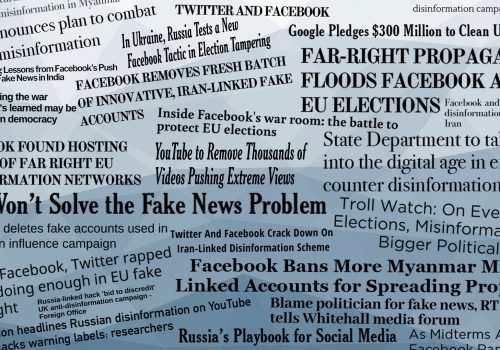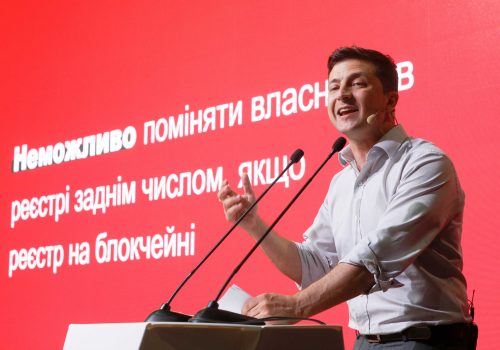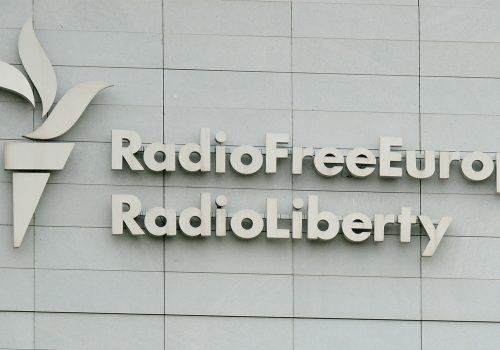How the US can fight Russian disinformation for real
For the past three years, I have been on the front lines of the information war, most recently in Ukraine, Lithuania, and Georgia. I have worked alongside, interviewed and briefed policymakers throughout the region, and these experiences have presented a grim picture: the United States is abdicating its leadership in countering Russian disinformation.
Where we ought to be setting the rules of engagement, the tone, and the moral compass in responding to Russia’s information war, the United States has been a tardy, timid, or tertiary player, with much of our public servants’ good work on this issue stymied by domestic politicization. Disinformation is not a political issue; it is a democratic one.
Beyond that challenge, the United States has not invested sufficient resources to be competitive in the fight against disinformation. Russian information warfare continues to target the United States and our allies, as well as the rules-based international order. However, countering it has not been a budgetary priority.
Stay updated
As the world watches the Russian invasion of Ukraine unfold, UkraineAlert delivers the best Atlantic Council expert insight and analysis on Ukraine twice a week directly to your inbox.
Below I outline how the tactics and tools of Russian disinformation in Europe and Eurasia have changed over the past several years, explain the necessity to match American investments in fighting disinformation to the severity of the problem, and describe several areas that deserve further investment.
Observations from Ukraine, Lithuania, Georgia
I spent the spring of 2019 in Ukraine and Lithuania, which elected new presidents this year, and Georgia, which is currently engaged in mass protests against Russian influence. My research there illustrates how Russian disinformation has become less overt over the past three years, increasingly emphasizing private, hard-to-track, and harder-to-counter informational vectors.
In Ukraine, early in the election cycle, the State Security Service (SBU) uncovered a Russian plot to rent Facebook accounts from Ukrainians and use them to place political ads. Despite the SBU’s discovery and the fact that this behavior is strictly against Facebook’s terms of service, this monetization of influence seems to have continued. Facebook pages, groups, freelance boards, and standalone websites all advertised that any Facebook account more than six months old with at least 200 friends can earn about $100 per month — around one-third of the average Ukrainian salary — simply by handing over its account details to an advertiser.
In both Ukraine and Lithuania, as around the world, disinformation is spreading on increasingly-private platforms, namely “closed” or “secret” Facebook groups and encrypted messengers. Levels of trust within groups, often organized around a single theme or on one side of the political spectrum, is high, hastening the spread of low-quality information and outright falsehoods, while the ability of social media platforms, journalists, and researchers to track the flow of that information is low, given the privacy settings of these groups. Globally, groups are increasingly being used to organize disinformation campaigns or, worse, coordinate hate speech and violence. Problematically, Facebook is now incentivizing this behavior through its so-called “pivot to privacy,” which emphasizes communication in more private fora.
In Georgia, where opposition to the Russian government is strong and awareness of Russian information operations is high, Russian disinformation is delivered via domestic outlets that carry a nationalist or traditionalist message, themes which find strong support in Georgian society and are considered at odds with the country’s Western aspirations. The tools of soft power, including cultural organizations and the Orthodox Church, also provide the Kremlin an important vector to exert influence. This use of domestic entities as vectors of disinformation was one of the themes of recent anti-Kremlin protests in Tbilisi.
In short, the age of political advertising being paid for in rubles is waning. As disinformation moves “underground” and becomes harder to track and debunk on a case-by-case basis, equipping individuals is the key to countering it.
Eurasia Center events

Our Investments Must Match the Severity of the Problem
Russia is not afraid to make large investments, both monetary and human, into its information operations. The editor-in-chief of RT, Russia’s state-sponsored foreign propaganda outlet, described how after the Russia-Georgia War, in which Tbilisi’s ad hoc international outreach on English-language TV channels such as CNN eclipsed Moscow’s PR efforts, “it became absolutely clear to everyone…why we need such a thing as an international television channel representing the country. This is in itself a lesson. And of course, they began to pay more attention and understand that it costs money.”
That understanding appears to have continued; the planned budget for RT—arguably one of the least effective arms of the Russian government’s information warfare efforts, and certainly only a small part of the overall Russian disinformation ecosystem—is $277 million in 2020. Despite the attention paid to Russian disinformation over the past three years, the United States has not yet had a similar budgetary realization. I am not advocating that the United States match the Russian government’s spending on information warfare, nor am I arguing that we mimic its tactics. Instead, we must invest more in the tools already at our disposal, with an eye on empowering individuals, not endlessly fact-checking or playing whack-a-troll.
Empowering Individuals
Though Russian disinformation has changed since it entered the American awareness, it is still targeting the fissures in our societies and information ecosystems. To address this, Congress should invest more in programs that:
- Teach people how to navigate the modern information environment including through digital literacy training and civics programs. These programs would not simply teach people to separate “real” and “fake” news, but assist them in sampling a range of viewpoints to inform their daily lives and the criticism that is healthy for any democracy, while developing greater immunity to conspiratorial versions of the truth. The most impactful programs are likely to be presented outside of the context of responding directly to Russian disinformation, such as IREX’s Learn to Discern program.
- Inject more reliable information into the ecosystem. Radio Free Europe/Radio Liberty and Voice of America are invaluable resources in the Europe and Eurasia region, even in countries with a seemingly robust media environment. RFE/RL and VOA represent a standard for in-depth, fact-based, non-partisan journalism as a public good. Rather than decreasing funding for these efforts in the Europe and Eurasia region, their funding should be bolstered, allowing them to compete more effectively in an increasingly crowded media environment.
- The United States should also invest in the sustainability of local and independent media outlets. Often USG-funded programs focus on capacity-building though there is a great deal of excellent regional journalism. Independent Russian journalists were the first to uncover the so-called St. Petersburg “troll factory,” for instance, and the Organized Crime and Corruption Reporting Project relies on networks of local investigative reporters to break large, complex stories such as the exposure of the Panama Papers. Independent outlets in Eastern Europe and Eurasia face the same challenges as those in the United States: in the age of online advertising, they struggle to reach their audiences and to turn a profit. Helping them achieve those goals and continue their reporting for another year is more critical than another standard journalistic training.
- Engage people in countries on the front lines of the information war with firsthand educational and exchange experiences in the United States. It is impossible to calculate the return on investment of programs including Fulbright, the International Visitor Leadership Program, and the Future Leaders Exchange Program. These experiences are more powerful than any fact-check or counter-disinformation program; they provide participants with a firsthand look at American governance, values, and culture.
It is time for the US government to get serious about addressing disinformation and do so, in part, by targeting those most affected by it. None of these initiatives are political; they focus on empowering individuals to be active and informed citizens through generational investments in democratic discourse, civic engagement, and truth. Ultimately, these recommendations are a manifestation of America’s greatest strength: our values.
Nina Jankowicz is a Wilson Center Global Fellow at the Kennan Institute. Editor’s note: This column has been shortened and edited from testimony Jankowicz gave to the US House Committee on Appropriations, Subcommittee on State, Foreign Operations, and Related Programs on July 10, 2019.
Further reading
The views expressed in UkraineAlert are solely those of the authors and do not necessarily reflect the views of the Atlantic Council, its staff, or its supporters.

The Eurasia Center’s mission is to enhance transatlantic cooperation in promoting stability, democratic values and prosperity in Eurasia, from Eastern Europe and Turkey in the West to the Caucasus, Russia and Central Asia in the East.
Follow us on social media
and support our work
Image: A Russian flag and a 3D model of the Facebook logo is seen through a cutout of the Twitter logo in this photo illustration taken in Zenica, Bosnia and Herzegovina, May 22, 2015. REUTERS/Dado Ruvic



